The 19 Best SEO Tools to Find Valuable Keywords
October 1, 2021 •DJ Team

Auditing, tracking, searching, and reporting tools are used daily in the SEO industry.
For an SEO beginner, choosing the right tools and services can feel like a daunting task. Before researching potential options, take some time to map out what you're expecting from your SEO tool and what your needs are.
As Ahrefs pointed out in this study, 91% of online content gets zero traffic from Google. SEO keyword research tools can help you pinpoint exactly what your audience is looking for so you can write content for their needs and in turn, move higher up in page rankings.
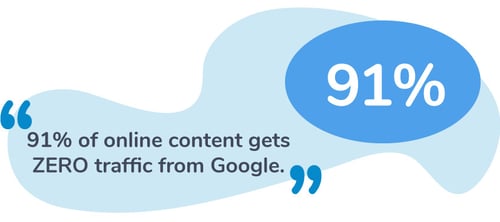
Let’s review elements of what a good SEO keyword research tool has to offer and how they can help you rank fast.
If you already know what your needs are and are looking for a list of SEO tools to get started here is a list of the best free keyword research tools.
Otherwise, let’s talk about what to look for in an SEO tool and the pros and cons of the solutions out there.
What to Look For in Keyword Research Tools
Are you wondering “How do I find the best keywords for my website?” If you're searching for the perfect SEO tool but you’re not sure what to look for, here’s a list of essential features and characteristics that a great SEO tool can have.
If you choose the right tool for your SEO job, it's going to make your time better spent.
Here are a few things to consider when picking an SEO tool for your marketing:
View Current Rankings for Targeted Search Terms
Look for an SEO tool that will give you an idea of where your website SEO stands now and how you’re ranking for related search terms and keywords. Perhaps your website is already well optimized, both technically and content-wise. Or maybe you have areas where you’re not ranking for the keywords you need.
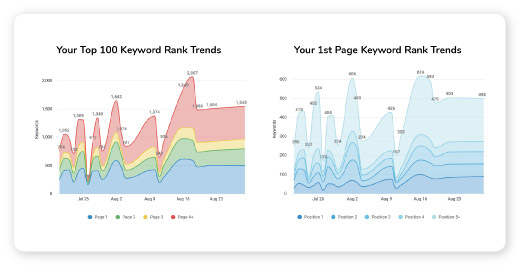 DemandJump (above) tracks your rankings over time to show you what is improving and what content to focus on.
DemandJump (above) tracks your rankings over time to show you what is improving and what content to focus on.
Picking an SEO tool that equips you with a score that is quick and easy to understand will tell you if you've got a problem worth investigating or if your SEO is good enough for now.
Keyword generator
It’s essential to know how your website content is performing based on keyword phrases to help you increase traffic.
Once you're informed on how you're currently ranking for certain keywords, you can determine whether you’re on the right track or you need to create additional content with more targeted keywords.
A keyword generator can help you determine important topics, questions, and keywords your team should be focusing on and identify competitive gaps where you can gain traffic share immediately.
When assessing an SEO keyword tool, make sure it gives you these metrics about keywords and your performances:
- Search volume: This metric will measure how many people are searching for a given topic. An SEO tool that includes search volume will allow you to see which keywords are a gold mine for content and which ones you should leave behind.
- Ranking: One of the most significant characters of SEO optimization is seeing where your site appears in search engine results pages (SERPs) for your keywords. This is a must when picking an SEO tool.
- Movement: Keywords aren't stagnant. The things people search for on search change. It might be obvious, but you want a keyword tool that shows how much your rankings have changed over time.
- Competitor rankings: Very rarely do businesses have little to no competitors. It's imperative to know where your competitors rank, especially in SEO marketing. The ability to track how competitors are ranking and for what keywords is a must with your SEO tool.
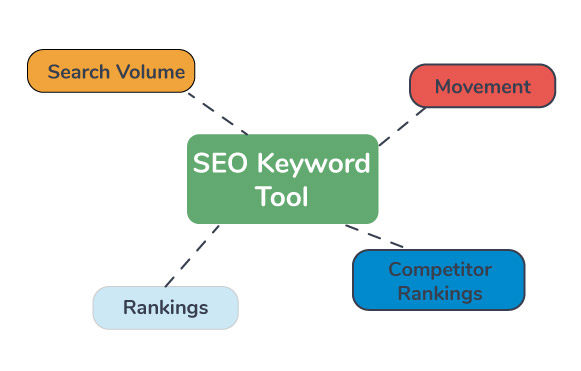
Content Ideas Generator
So now you have your keywords, but how do you use them in content? If you’re looking for a definite way to boost your SEO results, an intelligent content idea generator is the tool you want for the job.
These SEO-driven tools minimize time spent researching keywords and topics by providing you with short-tail, long-tail keywords, and phrases that if used correctly -- can improve your SEO ranking.
Essentially, these tools examine top-performing keywords and phrases to show you specifically which keywords to target so you can boost your organic search results. Some SEO tools even provide content outlines that give users recommended H1, H2, and H3 tags as well as exact keywords to use in each section.
Content with a word count between 750 and 3000 words generates the most organic traffic. So, creating long-form content can be valuable for SEO and can help you become a thought leader in your niche.
Marketing Attribution
How do you know if a keyword is profitable?
Some SEO tools allow CRM account integration so you can know with certainty which efforts are driving ROI. When a lead becomes a customer, you need to discern which keywords, marketing channel—or channels—should receive credit. Accurate account-based attribution will get you the most value out of your marketing spend.
Choose an SEO tool that lets you connect different attribution models side by side so you know how each touchpoint impacts conversions. That way, you can shift more of your budget to what’s actually working on your most powerful channels.
User-Friendly Interface
To put it bluntly, SEO can be complicated and intimidating. The tool you choose should have a low barrier to entry and a user-friendly interface. Most tools take a click or two to figure out, but anything that takes more than that isn't something you should be spending time on.
Things that will make a world of difference in an SEO tool:
- A strong help center and/or knowledge base that you can go to to get your questions answered.
- A clear, precise, and actionable guidance based on your website's current SEO status.
- For those who have waited on hold during a customer service call, you know a friendly and easily accessible customer support team is always a plus.
- A clear layout, coherent navigation, and well-thought-out user experience will be the cherry on top.
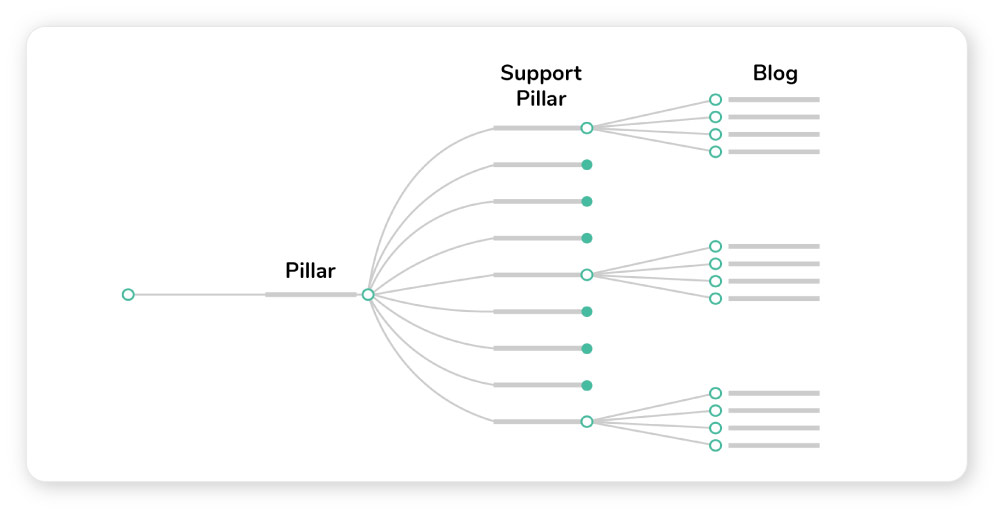 DemandJump's automated pillar page product (above) is an example of a clean UX showing you the exact content to create and how to link it.
DemandJump's automated pillar page product (above) is an example of a clean UX showing you the exact content to create and how to link it.
Your SEO tool should be a guide to help you learn the ropes, get your feet wet, and expand your knowledge. A tool is probably not right for you if it's too challenging, like throwing you in the deep end when you're learning to swim.
What are the Best Keyword Research Tools?
It starts with the right tools that can help you work smarter and faster in SEO. We’ve collected a sampling of the most beneficial SEO tools on the market.
These tools have a wide variety of uses and cover a number of common needs.
DemandJump
DemandJump is the leading marketing insights and attribution platform. The platform shows you what your target audience is searching for, what your competitors are doing, and what actions you should take next to achieve better outcomes.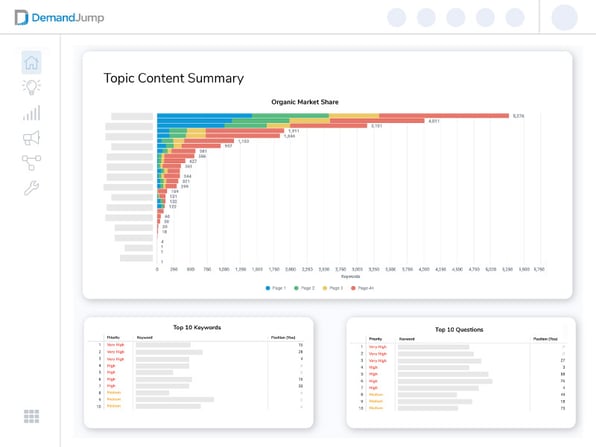
You will know exactly what content to write, what keywords to include, which websites to target, videos to produce, and much more.
DemandJump has a keyword finder that puts essential insights in one place and translates SEO strategy into action. The SEO Keyword reporting includes lists of short and long-tail keywords that uncover the questions your target audiences are searching for at crucial moments of their buying decision.
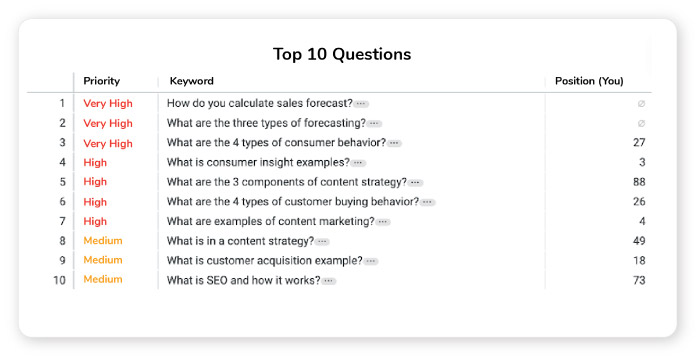
Every keyword is prioritized so you know exactly what action to take. DemandJump even pulls in competitor data to show their best-ranking content. Also, have you ever wondered “How do I know if a keyword is profitable?”
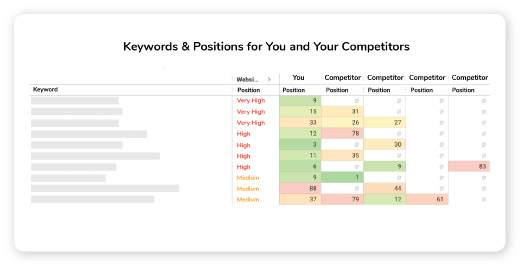
DemandJump solves this problem by measuring the effect of your content with our CRM integration tool where you can see which pieces of content are driving revenue.
From the intuitive consumer insight reports to content briefs that make it easy to write blog content that your customers will love AND that find themselves at the top of search results, DemandJump will take all guesswork out of your content marketing.
Moz Keyword Explorer
Moz's SEO platform offers several different tools created for keyword research. Although Moz doesn't include as many data points as some of the other full-featured SEO tools, this makes for a straightforward user experience for those who aren't professional search marketers.
With their Keyword Planner tool, you can search any keyword you choose and see its monthly volume, difficulty, and organic clickthrough rate (CTR).
Semrush
Semrush shares a ton of keyword data so you can dig into the details, like search engine results page (SERP) features and super specific analysis of current results. Semrush's keyword research tools can span from the standard traffic and search volume data to content-driven keyword research and competitive keyword gap analysis.
With their Keyword Gap feature, you can enter your competitors' websites and Semrush shows you the keywords they rank for but that you don't—making it simple to find new opportunities.
AnswerThePublic
AnswerThePublic works a bit differently, instead of a list of keywords, they present visual images of top keywords, although you can also see them in a list or download a .csv file of results.
All you have to do is type in your keyword and take a look at what comes up. The keyword results from this tool are based on Google and Bing's auto-suggest/auto-complete features. Within a search, you can click on any keyword and it will send you to a new tab with the Google results.
Still interested in learning more about SEO keyword tools? Here is a continued list of free and paid tools:
- Conductor is another extension for Google Chrome that allows you to identify the content topics your customers are searching for, create and optimize content, and measure your performance in organic search.
- Wincher optimizes your whole website, identifying keyword opportunities and tracking your ranking progress.
- Ubersuggest is Neil Patel's free tool that offers search volume data, keyword suggestions, and a rough idea of how difficult your keyword will be to rank for.
- Ahrefs is another keyword research tool that offers features similar to Semrush. Using Ahrefs keyword explorer, users can come up with keyword ideas simply by typing a keyword into the search box, then a whole list of keyword suggestions will be available.
- Are you still reading this list in search of more tools? Okay, well Google’s Keyword Planner is a good one. It was actually designed by advertisers who wanted to run their ads on Google; however, it’s still a useful tool for SEO, and unlike other tools, it's free to use.
- Long Tail Pro shows a data overview about the keyword your search for. The pro with this tool is that it puts specific focus on your website ranks against your competitors on the first page of Google.
- Serpstat is another keyword research tool where you can easily view the top Google results for your keyword.
- Since you're still reading, let's mention SpyFu. SpyFu is designed like a spy that lets you learn from your competitors by zooming into their most valuable keywords (and their ads too).
- RankIQ is built for content writers who aren't SEO pros. Instead of showing you a massive list of dizzying metrics, the tool uses artificial intelligence (AI) to analyze keyword data and gives you simple recommendations for creating blog posts.
- GetKeywords is a keyword research tool designed to focus on SEO keywords in a given area. When typing in your target keyword, you can narrow results down to the country, state/province, or even city level.
- You really want to be educated in all your keyword tools, don't you? Here's one of the leanest ones: QuestionDB. All you do is type a keyword or broad topic into the tool and it brings up a list of relevant questions people ask online.
- Jaaxy's keyword research tool is also straightforward: type in a keyword, URL, or keywords, and get basic stats on each.
- Keyword Surfer, a Google Chrome extension offers a lightweight way to do keyword research without leaving the search engine results page.
- Majestic is an all-in-one SEO tool to keep a track of your site’s SEO health.
- Wow, still here? We're impressed. To congratulate you, here's a weird one: Keyworddit is a unique tool that pulls keyword ideas from Reddit. Enter a subreddit, and it’ll search through the titles and comments of threads to find up to 500 keywords.
- Keyword Sheeter pulls thousands of autocomplete suggestions from Google.
If you made it through that exhaustive list, congrats, and well done! Now you're educated in about 20 SEO keyword tools. To reward you, we're offering you to create a free DemandJump account to kick off your keyword research and start ranking fast today!
What Is the Best SEO Tool to Find Useful and Valuable Keywords?
DemandJump.
When doing SEO research, you need a tool that can take you from research to results. DemandJump automates the keyword research process.
With one-click SEO content briefs for new content, recommendations for updating current content, and linking content to revenue generated with marketing attribution you are sure to see results.
Work smarter with automation tools designed to make content marketers look like rockstars.
Write content that ranks fast, and save time doing it - get started today!
Featured Articles
Categories
- Attribution Tracking (13)
- Channel Optimization (11)
- Consumer Insights (68)
- Content Marketing (251)
- Data Science (8)
- Digital Marketing (6)
- Digital Transformation (26)
- Enterprise (10)
- Lead Generation (14)
- Market Intelligence (8)
- Marketing Analytics (39)
- Marketing Attribution (57)
- Marketing Management (153)
- Marketing Operations (86)
- Organic Search (222)
- Paid Search (52)
- Pillar-Based Marketing (63)
- Programmatic Advertising (9)
- SaaS Content (14)
- SaaS Marketing (29)
- Search Marketing (111)
- SEO Keyword Research (28)
- SEO Pillar (18)
- SEO Strategy (46)
- SMB (5)
- Website Content (12)


